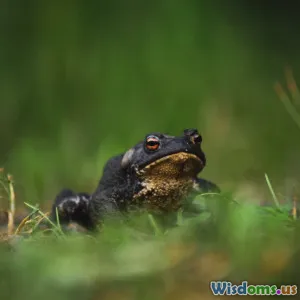
How Biodiversity Affects Human Health
8 min read Explore how biodiversity shapes human health through ecosystem services, disease regulation, and medicine discovery. (0 Reviews)
How Biodiversity Affects Human Health
Biodiversity—the dazzling variety of life on Earth—may seem like a natural spectacle to admire, but its implications stretch far beyond beauty. In fact, the diversity of species and ecosystems plays a crucial and often underappreciated role in sustaining human health and well-being. But how exactly does this complex web of life influence our bodies, our diseases, and even the medicines we rely on daily? This article dives into the essential connections between biodiversity and human health, offering insight backed by science and real-world examples that demonstrate why protecting wild species is integral to our future.
The Foundation: Biodiversity and Ecosystem Services
Ecosystem services are the natural benefits we get from healthy, functioning ecosystems—a lifeline for humanity. Biodiversity supports these services at every level.
-
Air and Water Purification: Wetlands, forests, and oceans filter pollutants from air and water. For example, reed beds help clean wastewater, reducing harmful pathogens and chemicals before they reach communities.
-
Climate Regulation: Diverse forests and oceans regulate temperature and store carbon dioxide. The Amazon rainforest—a biodiversity hotspot—acts as a global climate stabilizer, indirectly influencing human health by mitigating climate change effects like heatwaves and vector-borne diseases.
-
Pollination of Crops: Around 75% of the world's crops depend partly or wholly on animal pollinators, like bees, butterflies, and birds—species whose populations are declining. This decline threatens food security and nutritional health globally.
These services are impossible without complex interactions among myriad species. When biodiversity suffers, these services degrade, directly impacting human survival.
Biodiversity and Disease Regulation: A Complex Dance
One surprising aspect of biodiversity’s role is in controlling infectious diseases. The "dilution effect" hypothesis helps explain this pattern. It suggests that higher species diversity reduces disease transmission by limiting opportunities for pathogens to spread.
-
Lyme Disease Example: In the northeastern US, forests with diverse small mammal populations tend to have fewer Lyme disease cases. When only the most competent reservoir species (like white-footed mice) thrive in simplified ecosystems, ticks pick up more of the bacteria, increasing human risk.
-
Malaria and Mosquitoes: Ecological changes from deforestation and biodiversity loss often disrupt predator-prey balances. The removal of natural mosquito predators may increase malaria transmission risk.
However, it’s important to note this relationship is complex and context-dependent. In some cases, reduced biodiversity can lower disease risk. But the overall evidence points to healthy ecosystems as buffers against epidemics.
Nutritional Benefits: Biodiversity on Your Plate
A diverse natural world is also key to human nutrition. Wild foods, including plants, fish, and game, contribute to dietary diversity and micronutrient intake for many communities.
-
Wild Foods and Micronutrients: Studies in regions like sub-Saharan Africa show that communities relying on wild foods have better protein and vitamin A intakes.
-
Agro-biodiversity: Crop diversity enhances agricultural resilience and nutritional quality. Mono-cropping reduces variability, making populations vulnerable to nutrient deficiencies and crop failure diseases.
Thus, maintaining a variety of species in our environment can help counter “hidden hunger” — micronutrient deficiencies affecting billions globally.
Medicine through Biodiversity: Nature’s Pharmacy
The animal kingdom and plant species have provided humanity’s pharmacopeia for millennia. Almost half of new drugs approved between 1981 and 2019 are derived from natural products or their compounds.
-
Classic Examples: Aspirin originated from willow tree bark, quinine from the cinchona tree, and penicillin from fungi.
-
Modern Breakthroughs: The anticancer drug paclitaxel comes from the Pacific yew tree, underscoring rainforest biodiversity’s value.
-
Animal Venoms: Research into snake, spider, and cone snail venoms reveals agents for pain relief and cardiovascular treatments.
The rapid loss of species before they’re studied is a crisis. Scientists estimate millions of species remain undescribed, many potentially vital in medicine.
Psychological Well-being: The Biophilia Effect
Biodiversity also nourishes the human mind. Exposure to natural environments rich in species promotes psychological health.
-
Studies show contact with nature reduces stress hormones, improves mood, and accelerates recovery from illness.
-
Urban green spaces with diverse plant and bird species encourage physical activity, community interaction, and mental well-being.
Renowned Harvard biologist Edward O. Wilson termed this connection "biophilia," the innate human affinity for nature, linking biodiversity to mental health.
Threats and the Path Forward
Human activities—deforestation, pollution, climate change, and urban sprawl—are driving alarming biodiversity loss rates. The United Nations reports that around 1 million species face extinction, many within decades.
The consequences extend beyond environmental loss—they jeopardize food security, increase disease outbreaks, and limit medical innovation.
What Can We Do?
-
Conservation: Protect ecosystems through national parks, reserves, and sustainable land use.
-
Sustainable Practices: Promote agroecology, responsible fisheries, and reduce pollution levels.
-
Education and Advocacy: Inform communities and governments about biodiversity-health links.
-
Invest in Research: Support studies on species roles, biodiversity’s impact on health, and natural product discovery.
Conclusion: A Web of Life Worth Saving
Biodiversity isn’t just nature’s decoration; it’s a fundamental pillar of human health. From clean air and water to disease control, nutritional support, medicine, and mental welfare, the links are profound and scientific. Our well-being is inseparable from the vitality of the animal kingdom and broader biological communities.
As the planet faces unprecedented biodiversity crises, protecting and restoring species richness is urgent—our health quite literally depends on it. Embracing sustainable coexistence with the natural world remains the most potent prescription for a healthier, safer, and more resilient future.
By recognizing biodiversity as an essential ally, humanity takes a vital step toward holistic health and planetary stewardship.
Rate the Post
User Reviews
Popular Posts




















